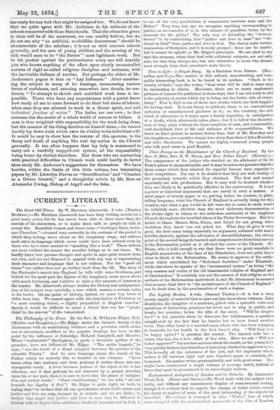Three Essays on the Maintenance of the Church of England.
By the Rev. C. Hole, Rev. R. W. Dixon, and Rev. Julius Lloyd. (Murray.)— The competence of the judges who decided on the allotment at Sir H. Peek's prizes is unquestionable, and it may be taken for granted that the three essays which they selected for especial honour were superior to their competitors. Nor can it be doubted that they are well worthy of the pecuniary rewards which they obtained. The first and second especially are able productions. But it may well be doubted whether they are likely to be practically effective in the controversy. It is not a priori or historical arguments that are useful in such a matter. A short paper of twenty pages or so, putting before its readers, in plain, telling language, what the Church of England is actually doing for this country, and what a gap would be left were she to cease to exist, would be infinitely more effective than the most elaborate demonstration of the divine right to tithes, or the unbroken continuity of the Anglican Church throughout the troubled times of the Tudor Sovereigns. But it is unfair to blame Messrs. Hole, Dixon, and Lloyd for not giving what doubtless they knew was not asked for. What they do -give is very good, the first essay being especially an argument, adduced with much forcible rhetoric, against the advocates of disestablishment ; the strong point of the second being its learned and comprehensive historical survey of the Reformation period as it affected the status of the Church. Mr. Dixon, who is bold enough to say that there were no groat scandals in English monasteries at the time of the Dissolution, does not quite know what to think of the Reformation. He seems to approve of the settle- ment which established the "Reformed doctrines" under Elizabeth, while elsewhere he speaks of the "sacramental system" as being "the very essence and centre of the old immemorial religion of England and of Christendom." It certainly was not the essence of that religion as the authors of the Reformation understood it, and Mr. Dixon may be assured that no more fatal blow to "the maintenance of the Church of England" can be dealt than by the proclamation of such a dogma.


































 Previous page
Previous page